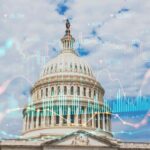Despite its longevity and popularity, betting on the outcome of U.S. elections has been of dubious legality for a long time.
The situation changed swiftly and decisively on October 3 when an Appeals Court elected to uphold the legality of the wagers over the Commodities Futures Trading Commission (CFTC) complaint that such a decision could compromise both the integrity and perception of the electoral process.
The ruling is set first to impact Kalshi, the company directly involved in the lawsuit over its prediction markets for other elections in the country.
Immediately after the courtroom victory, Kalshi established the Presidential election betting market.
The continuous popularity of electoral betting
Given the popularity of similar platforms, Kalshi is likely to see significant activity now that its betting operations have been ruled legal.
Polymarket, a decentralized prediction market platform, has, for example, been a prominent tool both for wagering on the electoral outcome and as an alternative to traditional polls for gauging the likely victor.
Both platforms’ offering extends far beyond betting on just the November results and it is possible to place wagers on a wide variety of world events, including CPI prints, rate cuts, different facets of popular culture, and much more.
Still, there has been no shortage of controversy with such markets, even once the recently ended lawsuit is disregarded.
In early September, the focus shifted to Polymarket as certain users allegedly attempted to manipulate betting odds by purchasing ‘yes’ shares for Kamala Harris and ‘no’ shares for Donald Trump.
Why millions are likely to flock to the now-legal prediction market
After a slow start, this election cycle turned highly exciting once President Biden left the race and Vice President Harris joined following the first and disastrous debate.
Indeed, after what appeared like an almost certain Trump victory – especially in the immediate aftermath of the Pennsylvania assassination attempt on the Republican candidate – things have become tense, with prediction markets generally providing 50:50 odds by October 4.
Historical data demonstrates this dynamic. Records on Polymarket show Donald Trump taking a massive lead over Joe Biden near the start of the summer, extending it in July and early August, only for Kamala Harris to catch up by the middle of the eighth month to create a suspenseful and unpredictable race.









